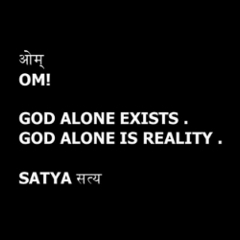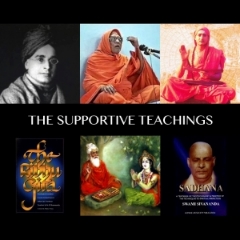A SPIRITUAL DIARY | LECTURING YOURSELF | IWGR II
| | homeTHE SPIRITUAL LAW OF CHARACTER | IWGR II | RAMA राम
|| < : A SPIRITUAL DIARY | LECTURING YOURSELF : > ||
Draw a diagram for your use and place on this diagram a list of the ordinary sins and shortcomings .
This table having been traced , you take the day of the week , perhaps on that day you have suffered from greed or grief ; you then place the mark ( x ) directly under the column headed greed or grief , along the line of the date and so on .
By keeping this private diary you can bring before you your shortcomings and be brought face to face with your weaknesses .
Rama does not recommend that these marks be kept on the diagram . Today you yield to some shortcoming ; be true to yourselves and put down the asterisk mark today .
Next day in the morning or at any time convenient to you , close the door , sit down all alone and open the chart before you and here you see that you yielded to greed or grief or whatever it may be ; then begin lecturing to yourself .
We in this country have too many lectures from others . Let all the great lecturers of the age come , let Christ or GOD ITSELF come and lecture , but lectures from others will be of no avail unless you are prepared to lecture to yourself .
One alone can raise oneself or make progress who lectures to oneself .
You know that you yielded to grief . Try and diagnose and prognose this feeling . Why were you overpowered by grief ? Find out the cause and then find a remedy for it .
You may at that time read an instructive book , say Bhagavad-Gita or the Bible , or Emerson's works , or any books which may tend to lift you from the plane of grief and with their aid and the aid of your own lectures , reflections , meditations , try to drive out this feeling from you forever .
If you feel convinced at that time that you have conquered and that you will not lose yourself again , no matter what may befall you , when you are assured you have trampled it under your feet , that you have gained the victory , then erase the asterisk mark .
You are free then . Why condemn yourself for the past ? Let the dead past bury its dead .
Take up these faults one by one , find the cause and the remedy for each , diagnose and prognose each one , lecture to yourself , but before such diagnosis and prognosis is done in this class , each one of you must lecture to yourself .
Each one will have to do the work for oneself . Sit down and meditate upon that which you suffer from , and while meditating chant or sing OM .
While the lips are chanting , while the voice hums this sacred syllable , while you are firm in your resolutions , the infinite blessings celestial are on you . You will be strengthened from within . These are some of the crested heads of the dragon which infested the lake of your minds . Crush them out one by one .
There is one common cause for all shortcomings , one common basis , root of all these evils , and that is Ignorance — Ignorance in all its shapes , especially Ignorance of the Real Self , Ignorance of the true Atman .
People identify themselves with the body , accumulate all sorts of things around it and want to have pleasures from without . They are identified with the body and are liable to be grieved or afflicted .
Rise above the body . Feel and realize that you are the Infinite , the Supreme Self , and how can you be affected by passion or greed ?
TPY | EYSP | PT1 | CH12 | SWAMI KRISHNANANDA
In the practice of yoga , in the understanding of vairagya , in self-control which is yoga , one should not be too enthusiastic . Over-enthusiasm is bad because it is mostly emotional , coupled with a kind of will-force but bereft of understanding , which creates a conflict psychologically and , consequently , even socially .
It is better that a student takes note of all desires .
" Have I a desire ? " It is no use saying , " I have no desire " .
If we have really no desires it is okay — very good , and so much the better — but we should be sure that we have no desires .
< : RAMA : > used to make a list of desires , used to go into a forest with a notebook or a diary and write ,
" How many desires have I got ? One , two , three , four , five , six , seven , eight , nine , ten ."
Every day , there would be checking ,
" How many have I finished ? Or are they all still there ? "
To the extent of the diminution of desires , we are free in this world ; and to the extent of the presence of these desires , we are bound in this world . Our bondage or freedom can be judged from the number of desires that are unfulfilled or fulfilled . If we have fulfilled all the desires and have no desires left , then we are free . But if we have not fulfilled our desires , if they are still there harassing us from inside , we are bound souls .
TPY | EYSP | PT2 | CH52 | SWAMI KRISHNANANDA
Inasmuch as our external relationships — which constitute the outward form of the relative self — have become part and parcel of our experience , they are inseparable from our consciousness . It requires a careful peeling out of these layers of self by very intelligent means .
The lowest attachment , or the least of attachments , should be tackled first . The intense attachments should not be tackled in the beginning . We have many types of attachment — there may be fifty , sixty , a hundred — but all of them are not of the same intensity .
There are certain vital spots in us which cannot be touched . They are very vehement , and it is better not to touch them in the beginning . But there are some milder aspects which can be tackled first , and the gradation of these attachments should be understood properly .
How many attachments are there , and how many affections ? What are the loves that are harassing the mind and causing agony ?
Make a list of them privately in your own diary , if you like .
They say < : RAMA : > used to do that — would make a list of all the desires and find out how many of them had been fulfilled :
" What is the condition ? Where am I standing ? " — and so on .
This is a kind of spiritual diary that you can create for yourself :
" How many loves are there which are troubling me ? How many things do I like in this world ? "
The percentage of attachment that you have towards these things also has to be properly understood . What is the percentage of love for " A " , " B " , " C " , " D " , etc ?
In a gradational order , tabulate the objects of sense or the conceptual objects , whatever they be , and note the degree of attachment involved in every particular case .
Take the least one , the simplest , as the first .
If you have a desire to sleep on a Dunlop cushion — well , you may think over this matter .
" Is a Dunlop cushion very necessary ? I can have a cotton mattress instead . "
This is not a very serious attachment , though it is an attachment . There are well-to-do aristocrats who may like to sleep on Dunlop beds , Dunlop pillows , have air-conditioning , and so on . These are desires , but they are not so vehement . There are other desires which cannot be touched immediately , and they have to be tackled later on .
By a very dispassionate and unattached attitude , one can diminish one's relationships with things which are really not essential for one's comfortable existence .
Let us assume that a comfortable existence is a necessity ; even that comfortable life can be led without these luxuries .
How many wristwatches have you got ? How many coats ? How many rooms are you occupying ? How much land have you ? How many acres ? — and so on .
CH UP | CHAP 4 | SECT 12 | CH52 | SWAMI KRISHNANANDA
We are told that < : RAMA : > had a peculiar technique for self-control , and used to make a list of all the desires .
It was no joke . It was an honest investigation into the mind .
To some extent we can know what our desires are . Go to a secluded place , or sit in your own room , or sit behind a temple or in a forest and think what your desires are .
You should not say , " I have no desires " . Nor can you say , " I do not know anything " .
You do know something , because it is the persistent thoughts in the mind that are your desires . When you are free from the distractions of the daily functions of life , your real desires will manifest themselves . These desires have to be dealt with in a proper manner . That is the discipline called for . . .
SOURCE | SATYAVEDISM.ORG



































































































